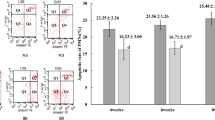Abstract
This study aims to research the effect of HSP65 on the expression of adhesion molecules in activated mice heart endothelial cells (MHECs), which were from myocardial tissue of newborn animals. We used different concentrations of LPS as potent inducers to stimulate MHECs, adhesion molecule expression in vitro, including intercellular adhesion molecule-1 (ICAM-1), vascular adhesion molecule-1 (VCAM-1), E-, and P-selectins, then compared the mRNA and protein levels of adhesion molecules expression with or without HSP65 treatment at different levels. The optimal concentration of LPS to induce MHECs adhesion molecule expression is 100 ng/ml; HSP65 treatment significantly reduced the mRNA and protein levels of MHECs’ ICAM-1, VCAM-1, E-, and P-selectins expression (p < 0.05), and the optimal concentration of HSP65 in inhibiting MHECs activation is 0.8 ng. HSP65 has the inhibitory effect on adhesion molecules expression in activated MHECs.









Similar content being viewed by others
References
Lu, H.H., Z.Q. Sheng, Y. Wang, and L. Zhang. 2010. Levels of soluble adhesion molecules in patients with various clinical presentations of coronary atherosclerosis. Chinese Medical Journal 123(21): 3123–3126.
Sitia, S., L. Tomasoni, F. Atzeni, et al. 2010. From endothelial dysfunction to atherosclerosis. Autoimmunity Reviews 9(12): 830–834.
Ribeiro, F., A.J. Alves, M. Teixeira, et al. 2009. Endothelial function and atherosclerosis: Circulatory markers with clinical usefulness. Revista Portuguesa de Cardiologia 28(10): 1121–1151.
Xu, Q. 2002. Role of heat shock proteins in atherosclerosis. Arteriosclerosis, Thrombosis, and Vascular Biology 22(10): 1547–1559.
Mayr, M., S. Kiechl, J. Willeit, et al. 2000. Infections, immunity, and atherosclerosis: associations of antibodies to Chlamydia pneumoniae, Helicobacter pylori, and cytomegalovirus with immune reactions to heat-shock protein 60 and carotid or femoral atherosclerosis. Circulation 102: 833–839.
Maron, R., G. Sukhova, A.M. Faria, et al. 2002. Mucosal administration of heat shock protein-65 decreases atherosclerosis and inflammation in aortic arch of low-density lipoprotein receptor-deficient mice. Circulation 106(13): 1708–1715.
Xiong, Q., J. Li, L. Jin, et al. 2009. Nasal immunization with heat shock protein 65 attenuates atherosclerosis and reduces serum lipids in cholesterol-fed wild-type rabbits probably through different mechanisms. Immunology Letters 125(1): 40–45.
Lim, Y.C., G. Garcia-Cardena, J.R. Allport, et al. 2003. Heterogeneity of endothelial cells from different organ sites in T-cell subset recruitment. American Journal of Pathology 162: 1591.
Tokgözoğlu, L. 2009. Atherosclerosis and the role of inflammation. Türk Kardiyoloji Derneği Arşivi 37(Suppl 4): 1–6.
Shimada, K. 2009. Immune system and atherosclerotic disease: heterogeneity of leukocyte subsets participating in the pathogenesis of atherosclerosis. Circulation Journal 73(6): 994–1001.
Patti, G., R. Melfi, and G. Di Sciascio. 2005. The role of endothelial dysfunction in the pathogenesis and in clinical practice of atherosclerosis. Current evidences. Recenti Progressi in Medicina 96(10): 499–507.
Tousoulis, D., M. Charakida, and C. Stefanadis. 2008. Endothelial function and inflammation in coronary artery disease. Postgraduate Medical Journal 84(993): 368–371.
Snoeckx, L.H., R.N. Cornelussen, F.A. Van Nieuwenhoven, R.S. Reneman, and G.J. Van Der Vusse. 2001. Heat shock proteins and cardiovascular pathophysiology. Physiological Reviews 81: 1461–1497.
Wu, C. 1995. Heat shock transcription factors: Structure and regulation. Annual Review of Cell and Developmental Biology 11: 441–469.
Pirkkala, L., P. Nykanen, and L. Sistonen. 2001. Roles of the heat shock transcription factors in regulation of the heat shock response and beyond. The FASEB Journal 15: 1118–1131.
Hoj, A., and B.K. Jakobsen. 1994. A short element required for turning off heat shock transcription factor: Evidence that phosphorylation enhances deactivation. EMBO Journal 13: 2617–2624.
Hu, Y., L. Cheng, B.W. Hochleitner, and Q. Xu. 1997. Activation of mitogen-activated protein kinases (ERK/JNK) and AP-1 transcription factor in rat carotid arteries after balloon injury. Arteriosclerosis, Thrombosis, and Vascular Biology 17: 2808–2816.
Guyton, K.Z., Y. Liu, M. Gorospe, Q. Xu, and N.J. Holbrook. 1996. Activation of mitogen-activated protein kinase by H2O2: role in cell survival following oxidant injury. Journal of Biological Chemistry 271: 4138–4142.
Metzler, B., C. Li, Y. Hu, G. Sturm, N. Ghaffari-Tabrizi, and Q. Xu. 1999. LDL stimulates mitogen-activated protein kinase phosphatase-1 expression, independent of LDL receptors, in vascular smooth muscle cells. Arteriosclerosis, Thrombosis, and Vascular Biology 19: 1862–1871.
Metzler, B., Y. Hu, G. Sturm, G. Wick, and Q. Xu. 1998. Induction of mitogen-activated protein kinase phosphatase-1 by arachidonic acid in vascular smooth muscle cells. Journal of Biological Chemistry 273: 33320–33326.
Hu, Y., H. Dietrich, B. Metzler, G. Wick, and Q. Xu. 2000. Hyperexpression and activation of extracellular signal-regulated kinases (ERK1/2) in atherosclerotic lesions of cholesterol-fed rabbits. Arteriosclerosis, Thrombosis, and Vascular Biology 20: 18–26.
Metzler, B., Y. Hu, H. Dietrich, and Q. Xu. 2000. Increased expression and activation of stress-activated protein kinases/c-Jun NH(2)-terminal protein kinases in atherosclerotic lesions coincide with p53. American Journal of Pathology 156: 1875–1886.
Li, C., and Q. Xu. 2000. Mechanical stress-initiated signal transductions in vascular smooth muscle cells. Cellular Signalling 12: 435–445.
Author information
Authors and Affiliations
Corresponding author
Electronic Supplementary Material
Below is the link to the electronic supplementary material.
Fig. s1
The inhibitory effect of HSP65 on endogenous VCAM-1, ICAM-1, P- and E-selectins expression determined by ELISA. Collected supernatants of MHECs cultures incubating with or without HSP65, then protein levels of VCAM-1, ICAM-1, P-, and E-selectins were detected after 12 h of incubation. The experiment has been performed for four times. (JPEG 18 kb)
Rights and permissions
About this article
Cite this article
Sun, C., Ji, H., Yu, J. et al. Effect of HSP65 on the Expression of Adhesion Molecules in Mice Heart Endothelial Cells. Inflammation 35, 1049–1057 (2012). https://doi.org/10.1007/s10753-011-9410-9
Published:
Issue Date:
DOI: https://doi.org/10.1007/s10753-011-9410-9




